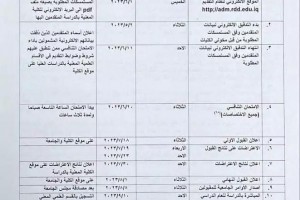
A doctoral thesis in the Department of Animal Production at the College of Agriculture at the University of Basrah discussed the evaluation of the effectiveness of the powder and aqueous extract of the root of the asparagus plant (Asparagus officinalis L.) by adding it to diets and drinking water and its effect on the performance of broilers and laying hens. The thesis of the student Rasoul Abd Ali Abbas and under the supervision of Prof. Dr. Rabia Jadoua Abbas included conducting a laboratory experiment and two field experiments. The laboratory experiment was conducted to evaluate the inhibitory activity of the aqueous and alcoholic extract of asparagus root against some types of bacteria, black fungus and pathogenic albicans yeast in the laboratory (using concentrations 50, 100, 150) mg/ml) for both extracts and 0.2 ml of distilled water and methanol alcohol was used as a control treatment, and (Tetracycline tablets as an antibiotic) were added. g/kg) and the addition of aqueous extract of asparagus root at a level of 5, 10, 15 (ml/L) in drinking water The third field experiment was used in which 105 laying hens of brown Lohmann strain, aged 20 weeks, using the levels of addition for the field experiment The first itself. The thesis aimed to know the effect of adding different levels of asparagus root powder and extract to the ration and drinking water, and to show their effect on the productive and physiological performance of broilers and laying hens. The thesis concluded that adding the aqueous extract of asparagus root at a level of 15.10 to drinking water and level 15 of asparagus root powder to the ration led to an improvement in production performance. The level 15 of aqueous extract of asparagus root recorded the best results, and the results also showed the positive role of the powder and extract of the root Asparagus plant supports and strengthens the immune system and improves some physiological characteristics of broilers and laying hens.


.jpg)





